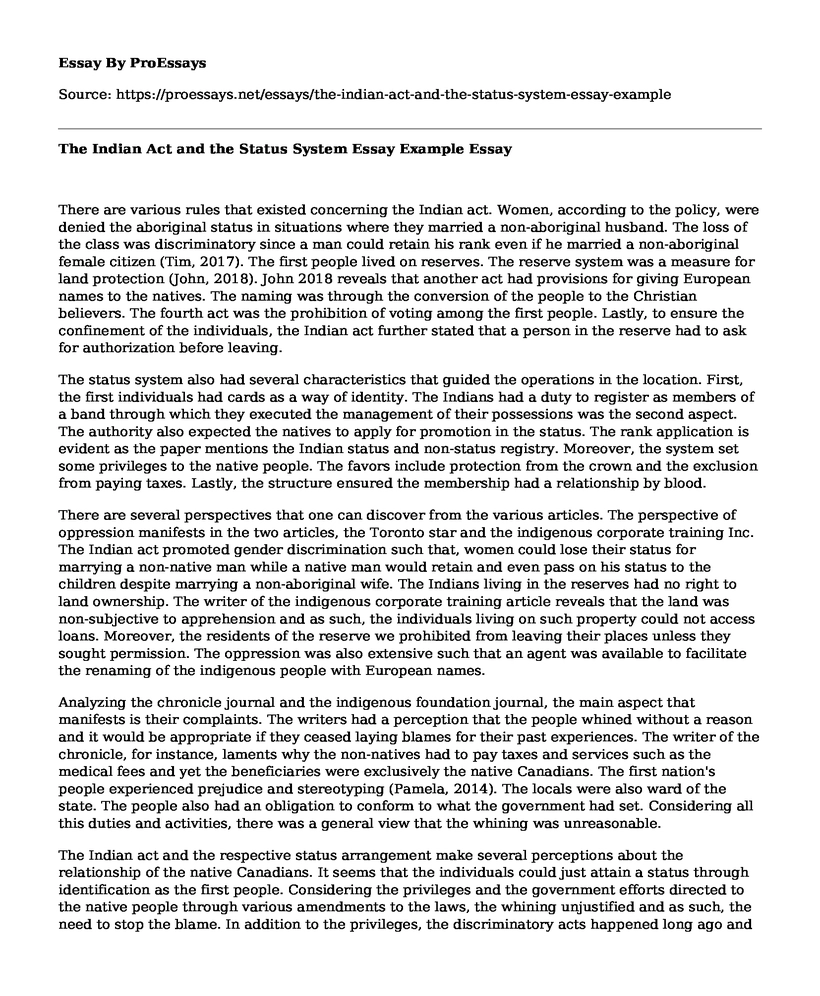There are various rules that existed concerning the Indian act. Women, according to the policy, were denied the aboriginal status in situations where they married a non-aboriginal husband. The loss of the class was discriminatory since a man could retain his rank even if he married a non-aboriginal female citizen (Tim, 2017). The first people lived on reserves. The reserve system was a measure for land protection (John, 2018). John 2018 reveals that another act had provisions for giving European names to the natives. The naming was through the conversion of the people to the Christian believers. The fourth act was the prohibition of voting among the first people. Lastly, to ensure the confinement of the individuals, the Indian act further stated that a person in the reserve had to ask for authorization before leaving.
The status system also had several characteristics that guided the operations in the location. First, the first individuals had cards as a way of identity. The Indians had a duty to register as members of a band through which they executed the management of their possessions was the second aspect. The authority also expected the natives to apply for promotion in the status. The rank application is evident as the paper mentions the Indian status and non-status registry. Moreover, the system set some privileges to the native people. The favors include protection from the crown and the exclusion from paying taxes. Lastly, the structure ensured the membership had a relationship by blood.
There are several perspectives that one can discover from the various articles. The perspective of oppression manifests in the two articles, the Toronto star and the indigenous corporate training Inc. The Indian act promoted gender discrimination such that, women could lose their status for marrying a non-native man while a native man would retain and even pass on his status to the children despite marrying a non-aboriginal wife. The Indians living in the reserves had no right to land ownership. The writer of the indigenous corporate training article reveals that the land was non-subjective to apprehension and as such, the individuals living on such property could not access loans. Moreover, the residents of the reserve we prohibited from leaving their places unless they sought permission. The oppression was also extensive such that an agent was available to facilitate the renaming of the indigenous people with European names.
Analyzing the chronicle journal and the indigenous foundation journal, the main aspect that manifests is their complaints. The writers had a perception that the people whined without a reason and it would be appropriate if they ceased laying blames for their past experiences. The writer of the chronicle, for instance, laments why the non-natives had to pay taxes and services such as the medical fees and yet the beneficiaries were exclusively the native Canadians. The first nation's people experienced prejudice and stereotyping (Pamela, 2014). The locals were also ward of the state. The people also had an obligation to conform to what the government had set. Considering all this duties and activities, there was a general view that the whining was unreasonable.
The Indian act and the respective status arrangement make several perceptions about the relationship of the native Canadians. It seems that the individuals could just attain a status through identification as the first people. Considering the privileges and the government efforts directed to the native people through various amendments to the laws, the whining unjustified and as such, the need to stop the blame. In addition to the privileges, the discriminatory acts happened long ago and as such, they needed to move on. The articles suggest that despite various shortcomings in the treatment they received, their experiences were not as frustrating as they claimed. The articles enable a reader to deduce several ideas about the life and activities of the aboriginal and the non-natives. In the first place, an individual could get status only if there was blood relation. The acquisition of status was conditional such that an individual could register and get the status by living on the reserve.
Conclusion
In conclusion, community development strategies require a leader who has knowledge of the origin of the people in a certain community. Knowledge and awareness of the history of peoples' behavior is also significant in alleviating biasness and stereotyping during the administrative period. These articles can also be helpful in enhancing sensitivity to the culture and beliefs of other people. Ideas from the editorials would also enable one to resist from being judgmental towards the way of life of other communities.
References
The hefty price tag for righting the wrong, Tim Harper, Article December 5, 2017 Retrieved from https://www.thestar.com/opinion/star-columnists/2017/12/05/the-hefty-price-tag-on-righting-historical-wrongs.html
Stop blaming me for the sins of the past. Letter to the editor by Pamela Joy Jensen, May 14, 2016, Retrieved from http://www.chroniclejournal.com/opinion/letters_to_editor/stop-blaming-me-for-the-sins-of-the-past/article_196de49e-194a-11e6-b9bb-33bad943932f.html
Indigenous foundations.arts.ubc.ca/the Indian act Retrieved from https://indigenousfoundations.arts.ubc.ca/the_indian_act/
Indigenous Corporate Training Inc Retrieved from https://www.ictinc.ca/blog/21-things-you-may-not-have-known-about-the-Indian-act-
Cite this page
The Indian Act and the Status System Essay Example. (2022, Aug 15). Retrieved from https://proessays.net/essays/the-indian-act-and-the-status-system-essay-example
If you are the original author of this essay and no longer wish to have it published on the ProEssays website, please click below to request its removal:
- Wilderness Programs for Juveniles Essay
- Legal and Ethical Issues in Nursing Paper Example
- Essay on Government (Public) Policies for Sport in Australia
- Essay Sample on Cultural Adaptation: How Puerto Rican Society Evolves
- Essay on the Limits of Political Blindness: Re-examining Democracy's Pillars
- Internationalism and Isolationism - Essay Sample
- Essay Sample on Trump's Tariffs Impact Steel: Essay Sample







